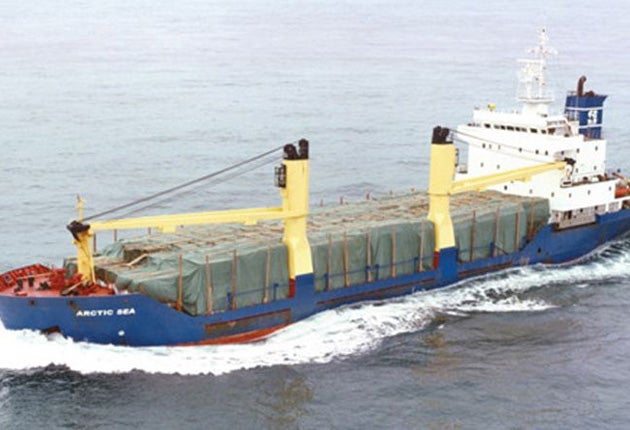Missing ship reported off Africa

Your support helps us to tell the story
From reproductive rights to climate change to Big Tech, The Independent is on the ground when the story is developing. Whether it's investigating the financials of Elon Musk's pro-Trump PAC or producing our latest documentary, 'The A Word', which shines a light on the American women fighting for reproductive rights, we know how important it is to parse out the facts from the messaging.
At such a critical moment in US history, we need reporters on the ground. Your donation allows us to keep sending journalists to speak to both sides of the story.
The Independent is trusted by Americans across the entire political spectrum. And unlike many other quality news outlets, we choose not to lock Americans out of our reporting and analysis with paywalls. We believe quality journalism should be available to everyone, paid for by those who can afford it.
Your support makes all the difference.The search for a Russian-manned cargo ship that vanished last month in the Atlantic reached far south along the West African coast today with unconfirmed reports of sightings near Cape Verde.
he Arctic Sea - carrying a load of timber and 15 Russian sailors - passed through the English Channel on 28 July. The freighter sent radio messages as it sailed along the coasts of France and Portugal, European officials said Friday. Then all contact was lost.
The Russian state news agency ITAR-Tass and the German paper Financial Times Deutschland reported that the ship was spotted near the islands of Cape Verde, a former Portuguese colony off the coast of West Africa. ITAR-Tass, reporting from London, cited unidentified officials at Nato; the newspaper cited two sources but did not identify them.
Russia's ambassador to Cape Verde said a Russian naval frigate was headed to the area. Alexander Karpushin said on Russian radio, however, he had no information on the Arctic Sea's location.
Nato spokesman Cmdr. Chris Davies said the organistion was monitoring the situation but was not directly involved in the search.
"We do not have a specific position," he said. Nato began watching developments after the ship reported coming under attack in the Baltic Sea because it was an unusual situation, he said.
The crew had reported that the ship was boarded June 24 in Swedish waters by up to a dozen masked men, who tied them up, questioned them about drug trafficking, beat them and carried out an extensive search before leaving 12 hours later in a high-speed inflatable boat.
The alleged attack, unusual in itself, raised further concerns because it was not reported until the freighter had passed through Britain's busy shipping lanes and was heading out into the wide Atlantic.
The European Commission suggested the Maltese-flagged ship may have come under attack a second time. "Radio calls were apparently received from the ship, which had supposedly been under attack twice, the first time off the Swedish coast and then off the Portuguese coast," said commission spokesman Martin Selmayr. He said he could add no further comment so as not to hinder the ongoing law enforcement activities.
The Portuguese Foreign Ministry said, however, that the ship was never in Portuguese territorial waters.
The ship's Russian operator, Solchart Arkhangelsk, said it had no information about a possible second attack.
French maritime authorities said they received radio messages on July 29 as the ship sailed past the north coast of France. The Arctic Sea's report to British maritime authorities as it passed through the Dover Strait, one of the world's busiest shipping lanes, was the last known voice contact with the crew.
The ship had been due to make port on 4 August in Algeria with a €1.3 million ($1.8 million) haul of timber.
The Malta Maritime Authority said the Arctic Sea "has not approached the Straits of Gibraltar, which indicates that the ship headed out in the Atlantic Ocean."
Speculation on what might have happened to the ship has ranged from suspicions that it was carrying secret cargo — possibly narcotics — to theories about a commercial dispute. Security experts have been wary of attributing its disappearance to bandits, noting that piracy is almost unheard of in European waters.
"It would seem that these acts, such as they have been reported, have nothing in common with 'traditional' acts of piracy or armed robbery at sea," Selmayr said.
David Osler, a maritime journalist at Lloyd's List in London, said there are three main types of piracy. There is the sort seen in Somalia, where a gang takes the ship and the captain, and demands a ransom in return for release.
In the Far East, criminals would steal the entire ship, repaint it and trade it — creating what are called "phantom ships," Osler said in an interview.
And in less developed areas, piracy has sometimes been more like armed robbery, he said, noting that ships often carry cash around for necessities while traveling. "It's like holding up the local liquor store," he said. "It's just for cash."
Osler said the 18-year-old Arctic Sea was not particularly valuable. "The ship isn't really worth stealing," he said, noting most such ships have a life of 20-25 years.
Join our commenting forum
Join thought-provoking conversations, follow other Independent readers and see their replies
Comments